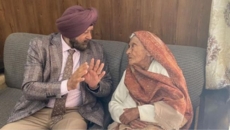Darpan engaged in a conversation with Vinayak Lohani, who boldly eschewed a traditional career trajectory to become a symbol of hope for India’s vulnerable children.
In a world where few dare to forsake a lucrative career and dedicate their lives to the welfare of others, Vinayak Lohani, an alumnus of the prestigious Indian Institute of Technology Kharagpur and the Indian Institute of Management Calcutta, chose a path that defied conventional. Inspired by the profound ideals of Swami Vivekananda and Sri Ramakrishna, Lohani, turned away from tempting opportunities and founded his non-profit organization Parivaar in 2003.

Starting with just three children in a modest rented apartment in West Bengal, Parivaar has evolved into a beacon of hope for numerous children, who are highly vulnerable to exploitation, victimization, and trafficking, including orphans, street children, abandoned children, and extremely impoverished children from tribal areas. Beyond this, the organization conducts various humanitarian activities for the destitute, including the elderly and those without shelter.

When asked about the defining moment that led to his shift from a potential corporate career to dedicating himself to humanitarian service, Lohani responds with a smile, “There wasn’t any one moment as such.” Reflecting on his journey, he shares, “After finishing my schooling in Bhopal, Madhya Pradesh, I pursued B.Tech at Kharagpur. Following that, a year at Infosys in Bangalore preceded my journey to IIM Kolkata. My journey was primarily driven by academic success and challenges. In those days it wasn’t easy to get admission in IIM, so it was more like an academic achievement for me, but I didn’t have a clear career plan then. The allure of a corporate career waned quickly. Although I admired entrepreneurship, it wasn't my pursuit. My heart was always drawn to the humanitarian service sector.”

During his time at IIM, Lohani initiated a successful volunteer group, engaging in activities such as visiting village schools and organizing health camps. This experience reinforced his belief that people are willing to serve and make an impact if given the opportunity, propelling him further into the realm of humanitarian service.
“So, I didn’t participate in the placement process at the end of my course, as my interest had shifted away from academics. Instead, I began visiting various organizations in and outside Kolkata. This exploration phase helped me understand the vast needs in the social sector, which isn’t competitive like the commercial entrepreneurial space. I realized that one doesn’t need a disruptive idea to make a difference, just the willingness to serve where there is a need. I had no grand idea; I was just driven by the desire to do something for the society. It was just the spirit of service. So, I started on a small scale with street children, children from red light areas, and other individual cases of crisis. It could be an orphaned child or single mother who is living in very difficult circumstances. That is how Parivaar was started in West Bengal,” explain Lohani.
Over the past two decades, Parivaar has metamorphosed the lives of thousands of children. In West Bengal, the organization boasts two residential institutions, accommodating around 2000 children from extremely vulnerable backgrounds. These institutions stand as the largest free residential establishments for such children in the state. In 2016, after 14 years of unwavering service in Bengal, Lohani expanded Parivaar’s reach to Madhya Pradesh. The Seva Kutirs in MP have since provided quality supplementary education and nutritious meals to over 50,000 children from impoverished Adivasi families across 15 districts. Additionally, the organization operates four residential institutions, housing approximately 1250 children from poor Adivasi families in three districts, with plans for annual scaling.
Parivaar’s impact extends beyond education. Operating 97 ambulances in tribal areas across 24 districts, the organization has served more than 2.25 lakh cases in the last 30 months. Its Vision Restoration project has benefited over 5.17 lakh individuals through general examinations, medicines, and glasses, fully restoring the vision of more than 57 thousand people. Furthermore, Parivaar runs 13 Daily Mobile Health Clinics in remote and impoverished areas across seven districts, providing free medicines to over 10 lakh individuals in the last 30 months.
Under Vinayak Lohani's visionary leadership, the organization thrives today. Despite its remarkable growth, Lohani humbly acknowledges, “The scaling of the organization was determined by the resources and people who joined us. Growth cannot be precisely defined, as opportunities present themselves unpredictably. Our organization has evolved to meet various needs over the years, and our growth contours are loosely defined. At the start, I wasn’t sure how many children we could manage, or when we could purchase our own land even. But with commitment and long-term dedication, these interim goals became less important. The key is not to focus solely on goal-based motivation but to embrace mission-based motivation. It’s more about the journey than fixed goalposts. While goals are important for self-evaluation and organizational efficiency, they shouldn’t be the only driving factor. If things don’t happen as planned or at the expected pace, frustration can creep in. Hence, a deeper level of motivation, beyond just goals or achievements, is necessary.”
True, the task at hand is not easy, so what keeps him motivated on day-to-day basis?
“Understanding and realizing one’s motivation is a continuous process. It’s important to remind oneself of why you started on this path. Challenges are part of every job, and everyone experiences stress at their workplace. In today’s fast-paced world, it’s easy to get caught up in the race and feel like you’re slipping. But these challenges shouldn’t deter you from your path. The line I chose was different, given my background, and the only challenges were to stay on this path. I never doubted the merit of this path, though I sometimes doubted my worthiness to be on it. I never regretted my choice,” reveals Lohani.
Vinayak Lohani's dedication has earned him recognition through several awards, including the National Award for Child Welfare 2011 presented by the President of India and the Sanskriti Award 2011 from former President Dr. A.P.J. Abdul Kalam. However, Lohani holds a unique perspective on awards and recognition, stating, “While it’s a common belief that awards or recognition can be beneficial, they don’t significantly impact an organization’s success. If an organization is fulfilling its promises to its stakeholders, donors, and beneficiaries, then external recognition doesn’t matter. Even a Nobel Peace Prize doesn’t necessarily impact an organization’s operations. There are many unrecognized, inspiring forces in our society, whose work is not defined by the awards or recognition they received. We need to decouple the idea of success from recognition. Success shouldn’t be based on recognition or validation from others. This mindset is prevalent in our aspirational social classes, which place a premium on success based on recognition. This attitude needs to be guarded against, especially in our sector. I feel even celebrity engagement can sometimes be problematic. If a high-net-worth individual is on an organization’s governing body, ordinary donors might think the organization already has ample support. While recognition and celebrity engagement might help to some extent, they’re not crucial.”

Indeed, starting from almost nothing, presently, Parivaar's initiatives stand as India's largest endeavours of their kind, addressing the needs of over 50 thousand underprivileged children and serving hundreds of thousands of impoverished tribal individuals through diverse health initiatives. In the fiscal year 2022-23, Parivaar allocated approximately Rs 76 Cr towards its various projects, boasting a dedicated workforce of 3800 individuals referred to as Sevavratees.
Looking ahead to 2024, Parivaar's roadmap includes plan to establish new residential campuses in select districts in Madhya Pradesh and introduce about 200 Seva Kutirs in Alirajpur (with the lowest literacy rate in the country) and Barwani. Additionally, the organization aims to set up Mobile Clinics in two tribal districts of Chhattisgarh and initiate Seva Kutirs in Purba Singhbhum district of Jharkhand.

As Parivaar continues to be a beacon of hope, Vinayak Lohani's perspective on success and recognition encourages a focus on service rather than accolades. His work inspires and brings hope to thousands. May his tribe rise.
Those wishing to help with Vinayak Lohani’s mission can volunteer at their centres or offer donations. For more details, please visit their website: https://parivaar.org/






